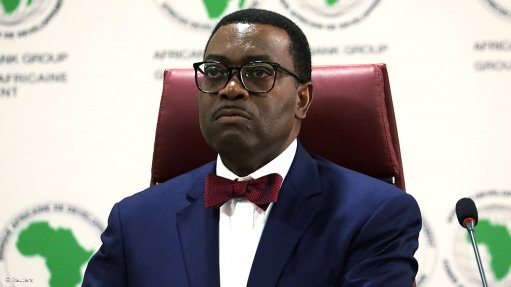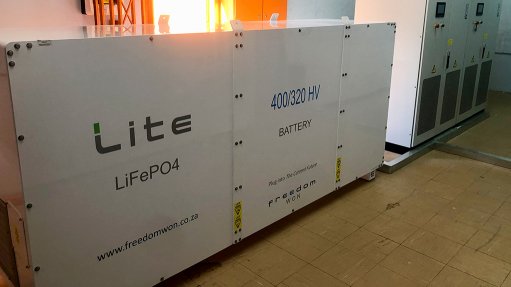SA urged to implement green econ development only if viable
South Africa must only adopt a green approach to developing its economy, if it made economic sense, World Wide Fund for Nature South Africa Living Planet Unit head Saliem Fakir said on Tuesday.
Speaking at the first leg of the Green Growth Roadshow, which is funded by the British High Commission and hosted in collaboration with the National Business Initiative, he said the question was not whether or not South Africa needed green growth, but rather whether or not it made sense to pursue this.
“[The question is whether or not] we can do it on scale because it creates broader opportunities, [rather] than just reducing emissions and fighting climate change, but also driving new sectors where there will be new enterprise, investment and job creation,” Fakir stated.
He said a structural shift in South Africa’s mining sector was viable, as it had shed a substantial number of jobs over the past 40 years, owing to various reasons, including mechanisation and labour difficulties.
“But we cannot do it at the expense of the economy,” Fakir warned, stating that a low-carbon transition in the mining sector that led to further job losses would not benefit South Africa’s economy, which was already burdened by high unemployment, especially among the youth.
South Africa’s high unemployment rate gave way to a second challenge that hampered its move to green growth, which was a limited budget to invest in green development. This shortage was amplified by the fact that South Africa was reaching a point of saturation in terms of taxable income. “So, we have to increase jobs to increase the payroll and the country’s tax income.”
Fakir said that, on its path to a greener economy, South Africa would have to also improve the efficiency of its current economy.
“We cannot dismiss that we have vast mineral resources; the debate is how we improve the efficiency and productivity of that sector so that it is a more inclusive economy.”
The country would also need to diversify its energy base in a bid to achieve green development.
“We have to increase investment flows into this sector and find the means to maintain the long-term visibility of these investments. Without this, we cannot drive other long-term benefits such as industrial development and manufacturing,” he stated.
Fakir further pointed out that, to build a new South African economy amid the existing constraints, a good human-capital base that featured strong levels of diverse entrepreneurship, would be required to initiate and carry out new ideas.
He added that South Africa would also have to find ways to reduce the capital cost of developing the required infrastructure that would assist in the country’s transition to a low-carbon economy.
“We cannot base our future welfare on our depleting resources, we have to find ways to build a new economy, while recognising that the principle that defines that has to be resource efficiency,” Fakir stated.
Meanwhile, London School of Economics Grantham Research Institute on Climate Change and the Environment senior research fellow Dr Cameron Hepburn pointed out that although economic growth in South Africa and globally in a “business-as-usual” manner, which he referred to as “dirty growth”, would create wealth, it would be lower than that created through green economic growth.
“The social and medical issues associated with dirty growth reduce wealth and [this] is often not taken into account. If it was, it would show that real growth is lower,” Hepburn explained.
He said a smarter green growth model would require human or intellectual capital to substitute physical capital and offer long-term benefits such as increased job creation, a higher contribution to gross domestic product growth, as well environmental benefits.
Hepburn stated that the short-term challenge of transitioning to a green growth model and the fact that some countries had to take full advantage of their resources, was an issue. He, however, highlighted that the sooner countries starting moving to a more sustainable economic growth path, the more gradual the process would be.
Comments
Press Office
Announcements
What's On
Subscribe to improve your user experience...
Option 1 (equivalent of R125 a month):
Receive a weekly copy of Creamer Media's Engineering News & Mining Weekly magazine
(print copy for those in South Africa and e-magazine for those outside of South Africa)
Receive daily email newsletters
Access to full search results
Access archive of magazine back copies
Access to Projects in Progress
Access to ONE Research Report of your choice in PDF format
Option 2 (equivalent of R375 a month):
All benefits from Option 1
PLUS
Access to Creamer Media's Research Channel Africa for ALL Research Reports, in PDF format, on various industrial and mining sectors
including Electricity; Water; Energy Transition; Hydrogen; Roads, Rail and Ports; Coal; Gold; Platinum; Battery Metals; etc.
Already a subscriber?
Forgotten your password?
Receive weekly copy of Creamer Media's Engineering News & Mining Weekly magazine (print copy for those in South Africa and e-magazine for those outside of South Africa)
➕
Recieve daily email newsletters
➕
Access to full search results
➕
Access archive of magazine back copies
➕
Access to Projects in Progress
➕
Access to ONE Research Report of your choice in PDF format
RESEARCH CHANNEL AFRICA
R4500 (equivalent of R375 a month)
SUBSCRIBEAll benefits from Option 1
➕
Access to Creamer Media's Research Channel Africa for ALL Research Reports on various industrial and mining sectors, in PDF format, including on:
Electricity
➕
Water
➕
Energy Transition
➕
Hydrogen
➕
Roads, Rail and Ports
➕
Coal
➕
Gold
➕
Platinum
➕
Battery Metals
➕
etc.
Receive all benefits from Option 1 or Option 2 delivered to numerous people at your company
➕
Multiple User names and Passwords for simultaneous log-ins
➕
Intranet integration access to all in your organisation


















